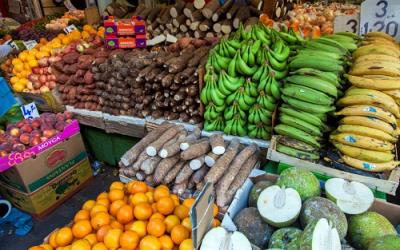
[ad_1]
The World Health Organization (WHO) has expressed concern at the potential impact of Covid-19 on food security, which is likely to exacerbate the already considerable burden of malnutrition in Africa.
The impact of the disease is expected to be greater among those grappling with food scarcity and malnutrition, while widespread food insecurity will likely increase due to movement restrictions.
“COVID-19 is unfolding in Africa against a backdrop of worrying levels of hunger and undernourishment, which could worsen as the virus threatens livelihoods and household economies,” said Dr Matshidiso Moeti, WHO Regional Director for Africa. “Hunger and malnutrition heighten vulnerability to diseases, the consequences of which could be far reaching if not properly addressed.”
In Africa, it is estimated that one in five people is undernourished, and that 30% of children under five – approximately 59 million children – have stunted growth, greater than the global average of 21.9%. Wasting occurs in approximately 7.1% of children in Africa.
The continent has the highest burden of malnutrition compared with other parts of the world, in terms of percentage of the population. While there has been little research so far into malnutrition as a co-morbidity for COVID-19, people with weakened immune systems as a result of undernourishment are at greater risk of a range of serious illnesses and so are likely to be more severely affected by the virus.
Recent estimates of food insecurity have suggested that as many as 73 million people in Africa were acutely food insecure. COVID-19 is exacerbating food shortages, as food imports, transportation and agricultural production have all been hampered by a combination of lockdowns, travel restrictions and physical distancing measures.
The burden of movement restrictions and lockdowns is being felt particularly strongly by low-income households and those working in the informal economy due to their loss of livelihoods and inability to access markets.
Some countries have already announced measures to mitigate some of the risks of lockdowns on food supply, from in-kind distributions to this week’s announcement by Heads of State of the East African Community of their intention to develop a mechanism for tracking and certification of cross- border truck drivers to ensure the safe delivery of essential goods.
But malnutrition is also a concern for households that had the means to stock up on food before lockdowns. Greater consumption of processed and canned foods combined with reduced physical exercise could worsen obesity and diabetes, risk factors that have been documented as increasing the severity of COVID-19. The most recent global nutrition report estimated that 17% of women and 7% of men in Africa are obese.
“Covid-19 does not treat us equally, and whether or not we have a healthy, nutritionally balanced diet is a key factor in how our bodies respond to the virus,” said Dr Moeti. “If we are not getting enough food, or not eating enough of the right sorts of food, our bodies will find it harder to fight off Covid-19 infection.”
WHO has developed guidance on how to maintain a healthy diet during confinement, emphasizing the importance of wholegrains and cereals, lentils, peas and beans. WHO is also issuing guidance on measures that countries should have in place as lockdowns end.
“As countries begin to relax their lockdowns, essential health services must be in place to meet the challenges posed by malnutrition,” Dr Moeti said. “It is important to remember that easing a lockdown should be thought of not as an event, but as a dynamic, data-driven process. If the epidemiological evidence suggests that restrictions need to remain in place, governments should ensure that measures are taken to alleviate hunger that might arise as a result of these restrictions. ”
WHO is recommending that Member States provide assistance to food insecure households, ensure that medical supplies and treatment capacities is reserved for handling patients with acute malnutrition, and that screening and referral mechanisms for acute malnutrition are in place.